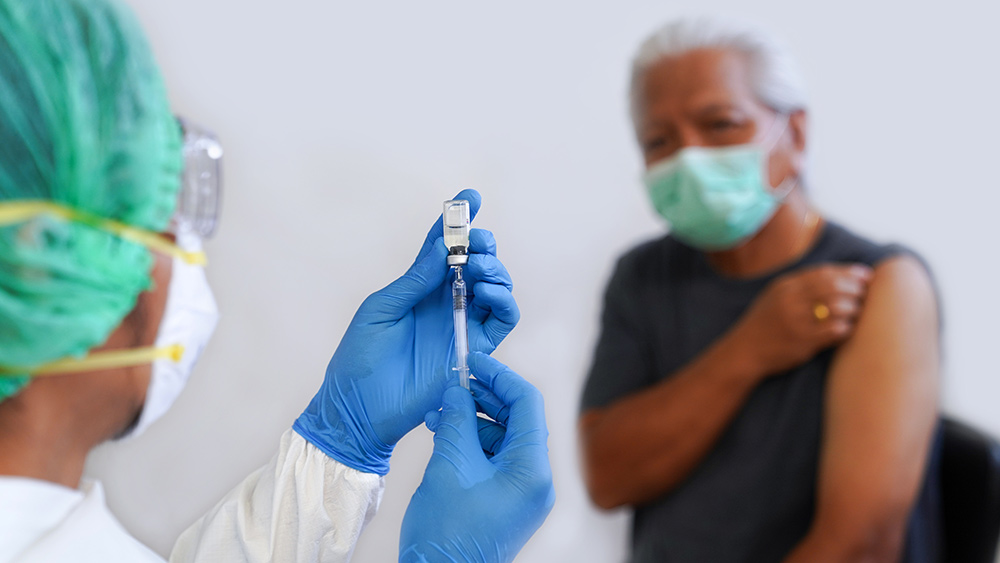
Data gathered by Johns Hopkins University definitively proves that the Wuhan coronavirus (COVID-19) vaccines have made the pandemic worse, and these dangerous shots are causing illnesses and deaths.
This is according to Joel Smalley, a quantitative data analyst from the United Kingdom, who has published a video titled "COVID Deaths Before and After Vaccination Programs." In the video, Smalley analyzes data from Johns Hopkins proving that countries all over the world experienced massive spikes in new COVID-19 illnesses and deaths after they were introduced to a large batch of COVID-19 vaccines.
The data points show the same surges in dozens of countries. Smalley is using this analysis to challenge the notion that the vaccines have shown enough efficacy to maintain their widespread use.
"COVID vaccines are between 50 percent and 80 percent effective in reducing severe illnesses and deaths," says Smalley. "They have to be at least 50 percent to retain emergency use authorization. Such dramatic efficacy should be apparent in the empirical, 'real-world' data. There should be very few country exceptions."
In Smalley's video, he presents weekly COVID-19 deaths per country before and after the introduction of the experimental and deadly coronavirus vaccines. The data shows a correlation between the distribution of COVID-19 vaccines and spikes in coronavirus-related deaths in approximately 40 different countries.
The video has highlighted some nations that either have very high vaccination rates or were praised early in the pandemic for their effective response to the coronavirus until the arrival of vaccines. These countries include the United Kingdom, Israel and Taiwan.
"While correlation does not prove causation, looking more broadly at relevant data, a worldwide trend of high rates of infections, hospitalizations and deaths can be found among the vaccinated," writes journalist Patrick Delaney of Life Site News.
Data from around the world proves COVID-19 vaccines cause more illness and death
The phenomenon of countries experiencing sudden surges in new COVID-19 infections and deaths after a recent high degree of vaccine administration has become a universal trend.
Even Pfizer has recognized this correlation when it revealed in a document submitted to the Food and Drug Administration that the company's COVID-19 vaccine makes people around 300 percent more likely to get COVID-19.
Dr. Peter McCullough, a medical professional with specialties in internal medicine and cardiology, has mentioned a study that found "vaccinated individuals carry 251 times the load of COVID-19 viruses in their nostrils compared to the unvaccinated."
"While moderating the symptoms of infection, the jab allows vaccinated individuals to carry unusually high viral loads without becoming ill at first, potentially transforming them into pre-symptomatic super spreaders," writes McCullough. He believes this is the reason why many places with high vaccination rates are experiencing "prominent outbreaks" among vaccinated individuals.
In September, around 75 percent of the people in Vermont who died from COVID-19 were fully vaccinated.
Back in July, it was reported that around 40 percent of the people hospitalized for COVID-19 were fully vaccinated. More recently, as emphasized by Republican Sen. Ron Johnson of Wisconsin, Public Health England admitted that around 63 percent of people in the U.K. who succumbed to the post-vaccine delta variant were also vaccinated. (Related: BBC: 2 in 3 confirmed COVID-19 cases in the UK are among the vaccinated; 87% of hospitalizations are among the vaxxed.)
In Israel, one of the world's most vaccinated nations, COVID-19 cases and hospitalizations among the vaccinated have been skyrocketing in recent months.
Dr. Kobi Haviv, director of Herzog Hospital in Jerusalem, noted during an appearance on Israeli Channel 13 that "most of the population" of Israel is already vaccinated. Despite this, his hospital is still seeing a lot of COVID-19 cases being admitted.
According to Haviv, between 85 to 90 percent of hospitalizations in Herzog Hospital are fully vaccinated. Furthermore, around 95 percent of COVID-19 patients with severe cases are also vaccinated.
"We are opening more COVID wards," says Haviv. "The effectiveness of the vaccine is fading out."
Learn more about how dangerous it is for people to take the COVID-19 vaccines by reading the latest articles at Vaccines.news.
Sources include:
Please contact us for more information.



















